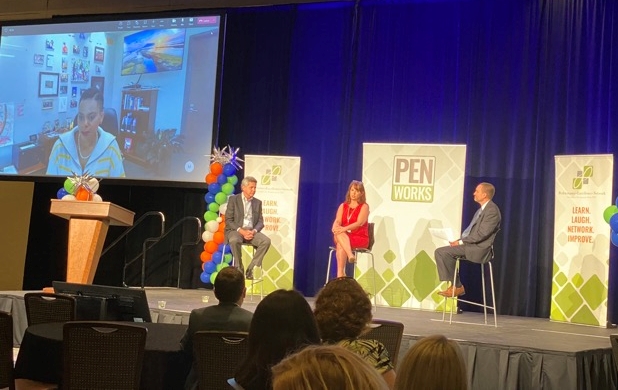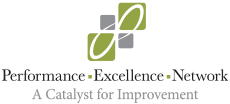
Charting the Course Forward: Insights from PENworks 2022 – May 2022
May 24, 2022
It’s been an incredible last couple of years. The convergence of so many historic events (the pandemic, staffing shortages, supply chain issues) have put considerable pressure on our organizations, our communities, and on us as leaders and professionals. But we’ve all learned a great deal. We’ve learned more about agility and the need to quickly shift and pivot; we’ve learned about personal and organizational resilience; we’ve learned (or been reminded) about what’s truly important. While the challenges are not over, collectively we are eager to move forward: to envision a more optimistic future, a better tomorrow – for our organizations, our communities, and ourselves.
Two weeks ago, PEN hosted our annual conference – PENworks 2022 – with the appropriate and relevant theme of CHARTING THE COURSE: Leading Forward. For those of you who participated, thank you! It was somewhat cathartic: for many of us, it was the first time in over two years that we convened as a group – to learn, to share, to network and (re)build relationships, to celebrate, to have fun. Long overdue. It was also quite an accomplishment for PEN, in that we successfully executed a fully hybrid, real-time event with about two-thirds in the room and one-third streaming live online. We had a few technical challenges (and we have a few opportunities for improvement for next year!), but all-in-all, our customers felt it was a successful event. And hopefully it “breaks the ice” and motivates many in our network to chart a course forward, resuming their investment in personal and organizational learning.
I probably say this every year, but I think this year’s speakers were extraordinary (and if you were one of them, thank you!). The quality of the content – the ideas, the insights, the methods, tools, and best practices shared – were all extremely valuable. Here are some of the insights delivered by the conference keynotes (at least the 63 insights that resonated with me the most!). Read them all the way through. Or maybe take one a day, reflect on it – use it as your “tip of the day” to help you or your team change or improve one thing. After all, little improvements eventually add up to big improvements.
And for those interested in obtaining an on-demand recording of the full conference (or any of the individual sessions), visit here. Individual sessions are $10 for PEN members ($20 for non-members); the full conference is $99 for members ($199 for non). I think you’ll find the conference absolutely full of insights that help chart a course forward to a better tomorrow.
Insights from Mauri Friestleben, Principal, Minneapolis North High School
“All of us – as leaders, as individuals – need to occasionally pause for a minute, reflect for a minute. It’s important to take time to think about what you’re doing and how you’re doing it, and what you could be doing better.”
“As leaders, when you take time to reflect, do it in a space with other people who make themselves vulnerable and who lead with humility.”
“One of my kindergarten teachers taught me right away: “you need to learn the difference between little deals and big deals.” Not everything is a big deal. But we all need to acknowledge the last two years. It’s been over 100 years since we’ve experienced a global pandemic like this. It’s a big deal. This isn’t something to take lightly.”
“The last time our world saw a global pandemic, we were different afterwards. We were very different. We had a collective brush with death. Women were bolder; the KKK grew active; Mein Kampf was created. We had the Roaring 20’s. We were changed. That’s a big deal.”
“One of the major things that drives me is when I look back on where I stood and what I was doing in moments of crisis, I want to be proud of myself. When you look at historical videos, you see how people showed up in hard times. Watch how you show up during hard times.”
“As you think about how you chart a course forward, what is your deep-down conviction? We are in some choppy waters, and if you don’t have an anchor, you’re not going to do well.”
“Faith is my cornerstone. Everyone needs to find their cornerstone.”
“It is in low moments that I am convinced that true and gritty and resilient leadership emerges.”
“If you’re in an environment where it’s difficult to motivate the people that you serve, then it’s also difficult to motivate the people that you lead who are also there to serve.”
“True leaders never miss an opportunity to lead.”
“Leaders give hope.”
“Leaders should focus on outcomes as much as possible.”
“Good leaders don’t lead for the people above them; they lead for the people below them. They lead for the people they serve.”
“Who and what you give airtime to – importance to – in your thoughts is who and what you focus on.”
“Highly emotionally and socially intelligent people are self-aware, they self-manage, and they are socially aware. You have to know yourself; you have to manage yourself; and you have to be aware of what’s happening around you. People with these three competencies are resilient.”
“Saying you want to be innovative is easy, but actually being innovative is extremely difficult. It requires an amazing amount of courage, creativity, collaboration, and humility.”
“When leaders support their people, they support their good behavior, their good performance. When behavior or performance is not so good, leaders need to hold their people accountable. Holding people accountable is being supportive.”
“Leaders sometimes need to slow down and see people – understand what is going on with them and who they really are. Good leaders are servant leaders.”
Insights from Deena Ebbert (aka “Propellergirl”)
“It’s so critical for us as leaders – as individuals – to take a pause and reflect on what’s important. We should occasionally ask ourselves: what are the three values most important to me RIGHT NOW? Those values shift, so ask frequently. And then use them to guide your life. It’s about focus, purpose and priorities.”
“When we laugh, we learn. When we laugh, we’re able to retain more information. Laughter is more than good medicine!”
“We learn more about people when we know their values – what’s really important to them. It helps us as leaders lead from the heart. All it requires is being curious and interested, and that requires a gesture of respect.”
“By giving and receiving respect, you build true collaborative relationships.”
“People are passionate about the concept of respect. Respecting others is critically important.”
“Every individual should answer the question: what are three reasons why I am awesome? It creates confidence; it creates momentum. It helps you identify what propels you – your core purpose.”
“Answering the question “what propels me” – your life’s true purpose – takes some time, some reflection.”
Insights from the Baldrige Recipient Plenary Keynotes
The last two years has forced us all to realize what’s really important. For me, it was about cherishing moments with my family and to better understanding my team and their needs. To maintain resilience, we need to keep refueling who we are so that we can better serve those we serve.” – Dr. Daria Willis, President, Howard Community College (MD)
“In order to create a plan for the future, you first need to hear from your customers, employees, and stakeholders. Planning requires understanding stakeholder needs.” – Willis
“For your employees to be innovative, leaders need to create time and space for them to be innovative.” – Willis
“To achieve excellence, focus on your priorities, keep things simple, and streamline and improve your processes.” – Willis
“To effectively communicate, every message we send needs to be clear, relevant, meaningful, and memorable.” – Willis
“Our planning process cascades strategic goals with action plans, vital signs, and outcomes. And every employee in every part of the organization (including the board) knows how their action plans align with certain strategic goals.” – Willis
“Much of our success is based on our use of data – for decision making, for planning, for improving processes.” – Willis
“Through the last two years, we’ve learned a lot about how to sustain performance – we use cross functional teams, use listening posts, use data to navigate change, and constantly shift and improve.” – Willis
“We were thankful that we had already started the excellence journey before the pandemic, because it gave us a major head start in understanding and shifting our processes.” – John Sackett, EVP & COO, Adventist Health Care (MD)
“The Baldrige Framework allows you to prove – with data – that you’re good or getting better.” – Sackett
“When we need to think about why we exist as an organization, we go back to our mission – our core purpose. It gives us strength, resolve. It helps us maintain resilience.” – Sackett
“Organizational (and personal) resilience first comes from acknowledging the difficulty of a situation and then following a process to navigate through it.” – Sackett
“Our leadership system is built on our core values and pillars of excellence, which promotes alignment of our mission with our standard management approach and strategic themes.” – Sackett
“The most used word in our leadership system is ‘we’ – excellence is a team sport.” – Sackett
“The role of leaders is to make it easy for other people to succeed.” – Sackett
“We use an approach for our standard work called ‘The Main Thing,’ which promotes focus and alignment of each employees’ work to what’s important.” – Sackett
“To solve a problem, first study the problem.” – Sackett
“One of the roles of leaders is to show where the finish line is – your people will figure out a way to get there. Set goals!” – Sackett
“Organizations cannot improve outcomes without improving processes.” – Sackett
“You can’t be innovative without first knowing the current best practice (and then trying to perfect on that).” – Sackett
“Every human wants to lead a successful life; every organization wants to be world class. But most don’t know how. It’s up to leadership to create a path forward to excellence.” – Sackett
“In times of crisis, we spent time reinvesting in our leadership team, our leadership systems, and our people.” – Stacey Crockett, Senior Communications Specialist, City of German Town (TN)
“Any organization can achieve true excellence. But you first have to want to achieve excellence.” – Crockett
“Consistent processes provide certainty in outcomes and makes employees’ job easier.” – Crockett
“Make sure your measures tell your story – don’t just measure things, but measure outcomes.” – Crockett
“Excellence doesn’t happen overnight. Keep at it – persist. It’ll be worth it.” – Crockett
“Excellence every day” is not a motto; it’s in our DNA – it’s how every employee is expected to perform every day for every stakeholder we serve.” – Crockett
“We learned a great deal during the crisis: focus on bold goals; don’t label the excellence effort, but just focus on process improvement; make sure you have the right people on the bus in the right seats.” – Crockett
“Everything is important, but not everything can be the MOST important. Prioritize.” – Crockett
John Kriesel, SSG Purple Heart Iraqi Veteran
“In war, you need to bring your A-game every. single. day. It’s not training; it’s not a drill. There is no room for error.”
“Regardless of how challenging things get in life, never give up hope – never give up.”
“Even if things are bad, remember that life is good, and attitude is a choice.”
“Sometimes you have to hit rock bottom before you can start living your life.”
“Today is a gift and tomorrow is never promised. It’s up to us to make today great.”
“It doesn’t matter what type of adversity we face or how big or how small that adversity is. What matters is the attitude that we bring to the table that will help us overcome that adversity – and overcome any challenge in life. A positive attitude, a sense of humor will not only help you get through adversity but thrive in spite of it.”
“Use adversity to learn and grow.”
“Some things in life you have no control over, but what you do have control over is my attitude today and my attitude going forward. It’s up to me to make today great.”
“We all have an occasional bad day – just don’t let it become a bad week or month. On your worst days, write 3-5 things on a Post-It note for which you’re grateful to remind yourself of what’s good in life. Because there is plenty. Life is good.”
“My experience reminded me of what’s truly important in life. The only certainty in life is adversity – it’s how you handle that adversity is what makes the difference.”
*****
I hope there were a few nuggets in there to inspire some reflection – maybe even some action. We’ve all experienced a remarkable last two years, really, a period that humans haven’t endured for over a century. But with every challenge comes opportunity. Here’s to charting a course and leading forward to a better brighter, better tomorrow.
What other insights/tips do you have regarding what drives excellence and how we all chart a course forward? Participate in a discussion on this topic: visit our LinkedIn group to post a comment. And follow me on Twitter @LassiterBrian!
Stay healthy and never stop improving!
Brian S. Lassiter
President, Performance Excellence Network
www.performanceexcellencenetwork.org
A Catalyst for Success Since 1987!
Photo credit Brian Lassiter







